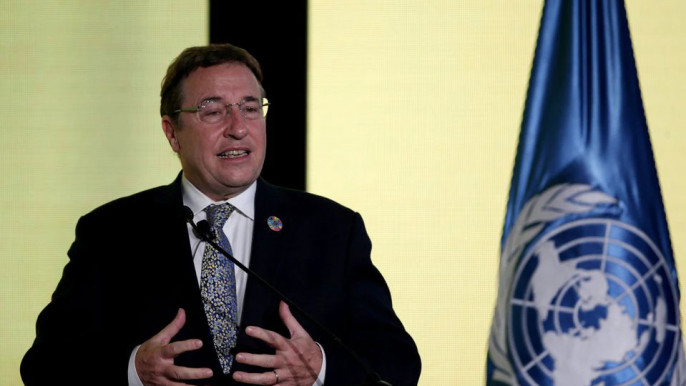
Achim Steiner, the UN’s global development chief, sad rich countries must "inject targeted liquidity into countries to be able to invest in energy transitions" (Photo by Reuters)
United Nations, November 13 (RHC)-- More than 50 of the poorest developing countries are teetering on the brink of bankruptcy due to their inability to pay debts unless the rich countries come forward with assistance, the head of the UN Development Program has warned.
Achim Steiner, the UN global development chief, speaking at the Cop27 UN climate summit in Egypt, said inflation, energy crisis and steep hike in interest rates have created a situation in which a large number of countries are at risk of default, which can have a catastrophic impact on people in those countries.
“There are currently 54 countries on our list [of those likely to default] and if we have more shocks – interest rates go up further, borrowing becomes more expensive, energy prices, food prices – it becomes almost inevitable that we will see a number of these economies unable to pay,” he said.
“And that creates a catastrophic scenario – look at Sri Lanka [which has descended into civil strife] with all the social and economic and political implications this carries with it.” The senior UN official warned that without helping these poor countries to clear their debts, they cannot be expected to deal with the climate crisis.
Steiner said any such default would create further problems for solving the climate crisis, warning that it "certainly will not help [climate] action." “The issue of debt has now become such a big problem for so many developing economies that dealing with the debt crisis becomes a precondition for actually accelerating climate action,” he said in his remarks.
“We need to inject targeted liquidity into countries to be able to invest in energy transitions, and adaptation [to the impacts of extreme weather].” He went on to say that poor countries are not receiving the funding promised by rich countries but instead are facing an increased risk of hurricanes, floods, droughts and heat waves.
Steiner warned that some developing countries could give up on climate talks if the governments of developed countries do not follow through on long-standing promises of $100 billion a year to help them reduce greenhouse gas emissions and adapt to the impacts of extreme weather.
UN Secretary-General Guterres said the planet “is fast approaching tipping points that will make climate chaos irreversible.” “If COP27 does not deliver a convergent path on the $100 billion, I think many developing countries will leave Sharm el-Sheikh at least thinking about their commitments to the global climate process,” he said. “And I say that very deliberately because it doesn’t mean they will stop doing things at home, which they are already doing.”
The UN chief asked the world to do something in this field and termed the slowdown in taking necessary measures as the biggest danger for poor and developing countries, adding that developing countries were already taking their own actions to tackle the climate crisis. “It’s building on something that in many of our countries is an established practice. When extraordinary floods take place and the taxpayer essentially steps in, with the government paying house owners the damage that has not been recoverable from insurance companies,” he said.
“We have an established practice that the common purse steps in where a catastrophic event happens. But when a Caribbean island has a third of its GDP wiped out in 12 hours through a hurricane, there’s nobody to turn to.” The UN official said that for this reason a damage and loss fund is needed.
“That’s where the injustice of climate change becomes so egregious in the view of many developing countries. Not having been even remotely a principal causal factor [in the climate crisis], they are now paying an extraordinary price through the damage they suffer," he noted.
According to Climate Action Tracker data, European and other governments are now planning new gas infrastructure and supply contracts that far exceed the amount of gas countries were previously importing from Russia.
The analysis shows that if all these agreements are met and infrastructure is built, temperatures will rise above the critical 1.5 degrees Celsius. The United Nations secretary-general Antonio Guterres issued a stark warning on Monday at the COP27 summit in Sharm el-Sheikh, Egypt, saying the world is losing its fight against climate change while also repeating his call to phase-out coal by the year 2040. “We are in the fight of our lives, and we are losing,” Guterres said.
“Greenhouse gas emissions keep growing, global temperatures keep rising, and our planet is fast approaching tipping points that will make climate chaos irreversible,” he said, adding that the world was "on a highway to climate hell with our foot still on the accelerator.”
The UN chief said rich nations would be expected to set a timetable for the delivery of $100 billion per year to help developing countries green their economies and build resilience against future climate change.

